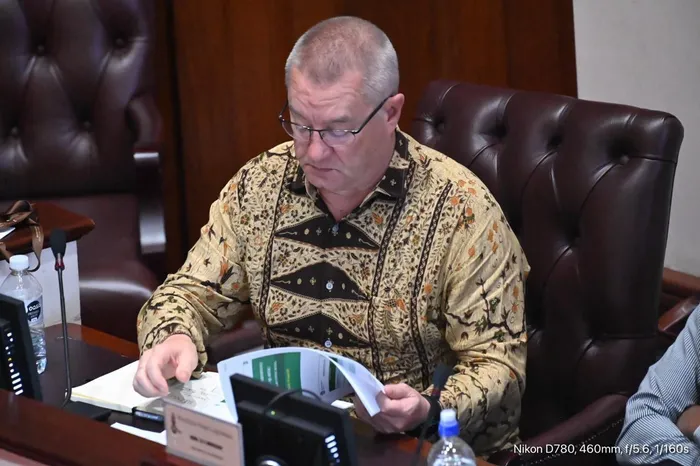
Francois Rodgers, the KwaZulu-Natal Finance MEC, at the Provincial Legislature on Tuesday.
Image: KZN Legislature
Salaries remained the biggest cost driver of Kwa-Zulu-Natal's government’s over-expenditure, particularly in education, where ghost employees are now being filtered out.
Francois Rodgers, the KZN Finance MEC, painted a bleak picture of the financial state of some municipalities when he briefed Members of the Provincial Legislature (MPLs) on the unaudited 2024/2025 financial year close-out report for provincial government departments, on Tuesday.
Rodgers said that together with his cabinet counterparts in the relevant departments he was undertaking a verification process of all employees. Rodgers said a head count is underway to deal with ghost employees. He also highlighted the pressure on the provincial fiscus, which continues to confront frontline departments such as Health, Education, and Social Development.
He said that KZN had experienced equitable share budget cuts amounting to more than R64 billion since 2020. He explained that in the 2024/2025 financial year, provincial expenditure amounted to R151.9 billion, exceeding the budget by R158.6 million. An amount totaling R7.8 billion has been accrued for the 2025/2026 financial year.
“The amount accrued far exceeds accruals from the past two financial years. Added to this amount is a further R3.2 billion of payments approved but not released due to unavailable cash, highlighting the over commitment by departments without the required funding being in place,” Rodgers said.
He told the committee that he was also concerned that from accruals, R3.2 billion is more than 30 days which is non-compliant with the Public Finance Management Act. Rodgers said this signals a negative impact on future budgets.
“We must ensure consequence management where there is clear evidence of financial misconduct,” Rodgers warned.
He said that the provincial cabinet has recently approved the KZN financial recovery plan aimed at restoring financial stability, eliminating wasteful expenditure and enhancing revenue collection.
Mthandeni Dlungwana, an ANC MPL and the Chairperson of the KZN Finance Portfolio Committee, said that the report presented the fiscal strengths and weaknesses in each KZN department.
“We will use the reports to assess the department’s performance in the first quarter of the current fiscal year. This is part of the ANC's broader mission to strengthen democratic oversight and build a capable, ethical, and developmental state in KwaZulu-Natal," Dlungwana said.
Tim Brauteseth, MPL and DA KZN Spokesperson on Finance, said the report reveals a pattern of unauthorised expenditure disguised as accruals, unrecovered staff debt and budgetary misalignment.
He explained that the departments such as Education and Health are now forced to use 2025/2026 budgets to settle 2024/2025 debts.
Despite these challenges, Brauteseth said that initiatives aimed at improving transparency and efficiency include:
• The rollout of financial dashboards, which have enhanced visibility into departmental spending and enabled better decision-making
• The implementation of e-procurement systems as a welcome step toward reducing corruption, improving compliance, and streamlining procurement processes
;• Treasury’s technical guidance on Modified Cash Standards and its engagement with National Treasury to secure roll-overs and clarify accounting treatments show a commitment to reform.
Related Topics: